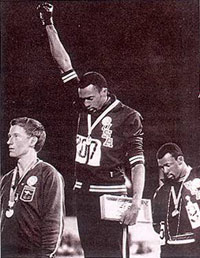Olympic controversies in history
[ 2006-08-07 13:14 ]
在現代奧運會歷史上,曾產生無數起大小糾紛。宗教信仰、種族歧視、政治利益影響著奧運的發展進程。讓我們一起走進歷史,回顧曾發生的一幕幕……
 Olympic controversies have always marred the history of
modern Olympic. Take for example 1900 in Paris, France; the track and field
finals were scheduled at Saturday, which coincidentally was Bastille Day, an
important day for the French. The French refused to compete and rescheduled it
on Sunday. However, Sunday is Christian day although the opening ceremony was to
be on a Saturday, the actual competition was to begin the following day, a
Sunday. Once again many American refused to compete. Olympic controversies have always marred the history of
modern Olympic. Take for example 1900 in Paris, France; the track and field
finals were scheduled at Saturday, which coincidentally was Bastille Day, an
important day for the French. The French refused to compete and rescheduled it
on Sunday. However, Sunday is Christian day although the opening ceremony was to
be on a Saturday, the actual competition was to begin the following day, a
Sunday. Once again many American refused to compete.
The Olympic achievements of the great American athlete Jim Thorpe were long
disqualified. A year after he won both the pentathlon and the decathlon at the
1912 Games, it was discovered that Thorpe had played semiprofessional baseball.
Thorpe's gold medals were taken from him. Sixty-nine years later, however, the
International Olympic Committee reinstated Thorpe's achievements and returned
his gold medals to his children.
At the 1936 Games, Adolf Hitler refused to meet Owens following the 100
meters, after Hitler had personally congratulated three earlier gold medal
winners. The next day the chairman of the International Olympic Committee,
Balillet Latour, approached Hitler early in the morning and told the German
leader that he had violated Olympic protocol. In fact, during the very first day
of Olympic competition, when Owens did not compete, Olympic protocol officers
implored Hitler to receive either all the medal winners or none, and he chose
the latter. Avery Brundage , president of the American Olympic Committee,
opposed a boycott, arguing that politics had no place in sport.
In 1956 Melbourne Australia, the flag of Taiwan was accidentally raised over
their camp, mainland China then withdrew form the Games.
Prior to the games in Mexico 1968, many students took the occasion to protest
that the money spent on the Olympics could be better spent on things that would
help the people and improve the quality of life. Also in Mexico, one of the most
controversial events where the Olympics, in this case the victory stand was once
again used for a political stand. After finishing first and third in the 200
meters run, Tommie Smith and John Carlos stood on the podium to receive their
gold and bronze medals. As the American anthem was played, they raised their
black-gloved fists in a "black-Power" salute. However, both men were
consequently suspended from the games and expelled from the Olympic village.
(Foreign and Domestic Olympic Stories) |